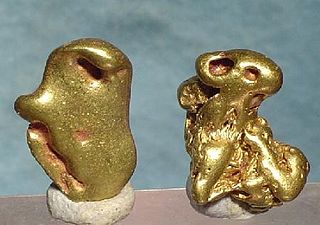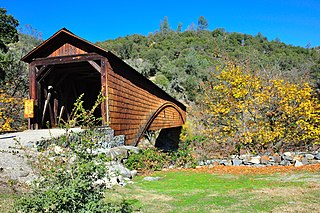Related Research Articles

A gold rush or gold fever is a new discovery of gold—sometimes accompanied by other precious metals and rare-earth minerals—that brings an onrush of miners seeking their fortune. Major gold rushes took place in the 19th century in Australia, New Zealand, Brazil, Canada, South Africa and the United States, while smaller gold rushes took place elsewhere.

Placer mining is the mining of stream bed (alluvial) deposits for minerals. This may be done by open-pit or by various surface excavating equipment or tunnelling equipment.

Mother lode is a principal vein or zone of gold or silver ore. The term is also used colloquially to refer to the real or imaginary origin of something valuable or in great abundance.

Gold mining is the resource extraction of gold by mining.

Washington is a census-designated place located in Nevada County, California. Washington is located on the banks of the South Fork of The Yuba River and has a population of approximately two hundred people. There is a hotel/bar and restaurant, grocery store, a one-room schoolhouse that has educated students continuously for one hundred years, and two trailer park campgrounds. The elevation is 3,652 feet (1,113 m). The population was 185 at the 2010 census.

The Yuba River is a tributary of the Feather River in the Sierra Nevada and eastern Sacramento Valley, in the U.S. state of California. The main stem of the river is about 40 miles (64 km) long, and its headwaters are split into three major forks. The Yuba River proper is formed at the confluence of the North Yuba and Middle Yuba Rivers, with the South Yuba joining a short distance downstream. Measured to the head of the North Yuba River, the Yuba River is just over 100 miles (160 km) long.

Bullards Bar is a former gold mining settlement in Yuba County, California.

Condemned Bar is a former settlement, in Yuba County, California.

North Bloomfield is a small unincorporated community located in Nevada County, California.
English Bar is a former mining settlement and stage stop in Yuba County, California.
Landers Bar is a former mining settlement of the California Gold Rush, in Yuba County, California.
Malay Camp is a former settlement and mining camp in Yuba County, California, United States.
Cordua Bar is a former mining town of the California Gold Rush, located in Yuba County, California.
Cape Horn Bar is a former settlement and mining camp of the California Gold Rush, in Yuba County, California.

Omega was a former settlement in Nevada County, California, United States, first populated in 1850 by a single miner, J.A. Dixon, working a claim during the California Gold Rush. The town was located 3.25 miles (5.2 km) east-southeast of the present-day unincorporated town of Washington, California. A sister town, Alpha, located at what is now the site of the historical Omega Hydraulic Diggings, was about 1 mi (1.6 km) north of Omega. In the mid 1850s, following the introduction of hydraulic mining operations nearby, the town prospered. Omega had a post office, and needed to convert a residence into a jail in late 1858.

Badger Hill is a former settlement in Nevada County, California. It is situated at an elevation of 2,552 ft (778 m) above sea level.

Bridgeport is a former settlement on the Yuba River in Nevada County, California, 2 mi (3.2 km) from the town of French Corral. Its elevation is 567 ft (173 m) above sea level.

Red Dog was a California gold rush mining town located in the Gold Country in south-central Nevada County, California, United States, 6 mi (9.7 km) northeast of Chicago Park. Red Dog Hill, a mine and campsite, was founded by three men all under the age of 22, and was named by their youngest, a 15-year-old prospector. As mining operations grew, the campsite became a settlement, and then a town with a population of 2,000 residents, before it was eventually abandoned. Still considered important today, Red Dog Townsite is listed on the National Register of Historic Places. Red Dog has been noted for its unusual place name.

Gold Run was a former mining town of the California Gold Rush, located in Placer County, California.
New South Wales experienced the first gold rush in Australia, a period generally accepted to lie between 1851 and 1880. This period in the history of New South Wales resulted in a rapid growth in the population and significant boost to the economy of the colony of New South Wales. The California Gold Rush three years prior signaled the impacts on society that gold fever would produce, both positive and negative. The New South Wales colonial government concealed the early discoveries, but various factors changed the policy.
References
- 1 2 Durham, David L. (1998). California's Geographic Names: A Gazetteer of Historic and Modern Names of the State. Clovis, Calif.: Word Dancer Press. p. 545. ISBN 1-884995-14-4.
| This Nevada County, California-related article is a stub. You can help Wikipedia by expanding it. |
